'A slow death': Gazans live alongside rotting rubbish and rodents
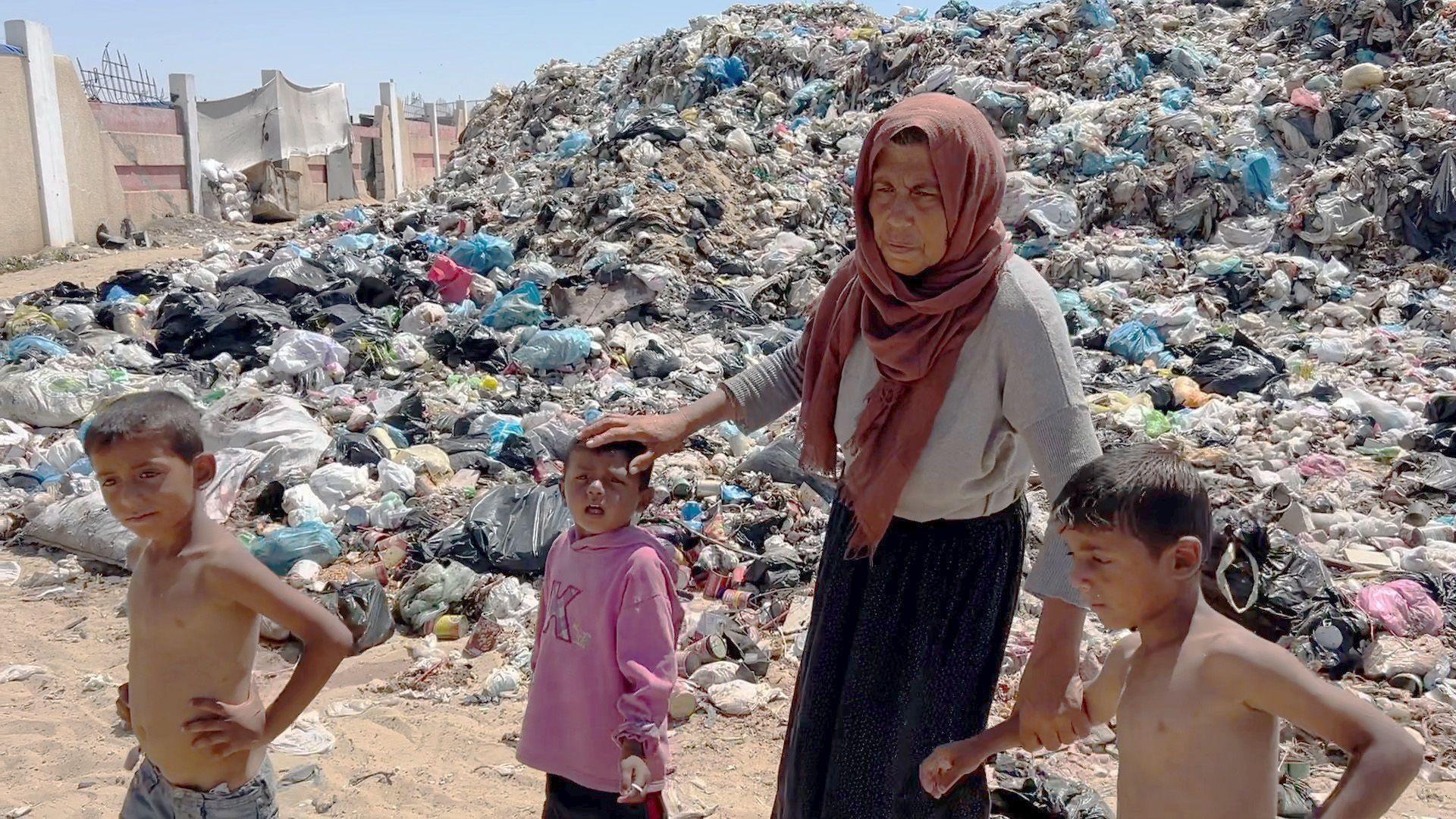
Asmahan al-Masri and 15 relatives live at a camp in Khan Younis, feet away from piles of rubbish
- Published
Across the Gaza Strip, in a landscape newly transformed by war, mountains of stinking rubbish pose severe dangers to health and the environment.
“We’ve never lived next to rubbish before,” says Asmahan al-Masri, a displaced woman, originally from Beit Hanoun in the north, whose home is now a wasteland in Khan Younis.
“I cry just like any other grandmother would over her grandchildren being sick and having scabies. This is like a slow death. There is no dignity.”
In eight months, more than 330,400 tonnes of solid waste are estimated to have built up in the Palestinian territory, according to the UN and humanitarian agencies working on sanitation.
Sixteen members of the Masri family share a tent in a camp near al-Aqsa University with clouds of flies and sometimes snakes. Stray dogs can roam menacingly nearby. All the residents complain of the constant stench.
“The smell is very disturbing. I keep my tent door open so that I can get some air, but there is no air,” Asmahan says. “Just the smell of rubbish.”
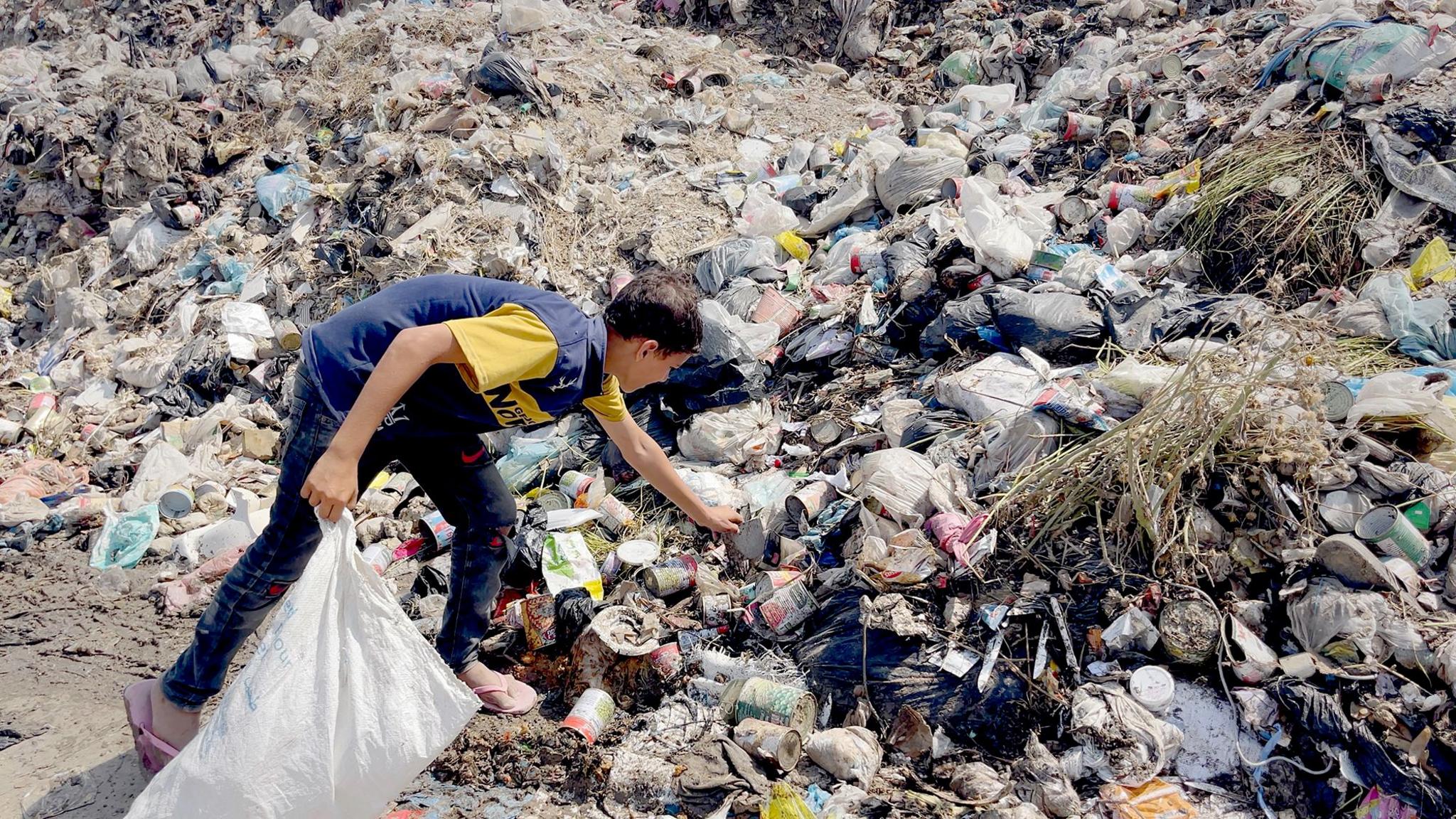
Desperation across Gaza is forcing many, like Mohamed, to scavenge for something to eat, use or sell
Some of the more than one million people who recently fled Israel’s military offensive in the southern city of Rafah have been forced to live in open areas that had already been turned into temporary refuse tips.
“We searched everywhere for a suitable place, but we are 18 people with our children and grandchildren, and we couldn’t find anywhere else where we could stay together,” says Ali Nasser, who recently moved to the al-Aqsa University campsite from his home in Rafah.
“The journey here cost us over 1,000 shekels ($268; £212) and now our finances are destroyed. We have no jobs, no income, and so we are forced to live in this dire situation. We suffer from vomiting, diarrhoea, and constantly itchy skin.”
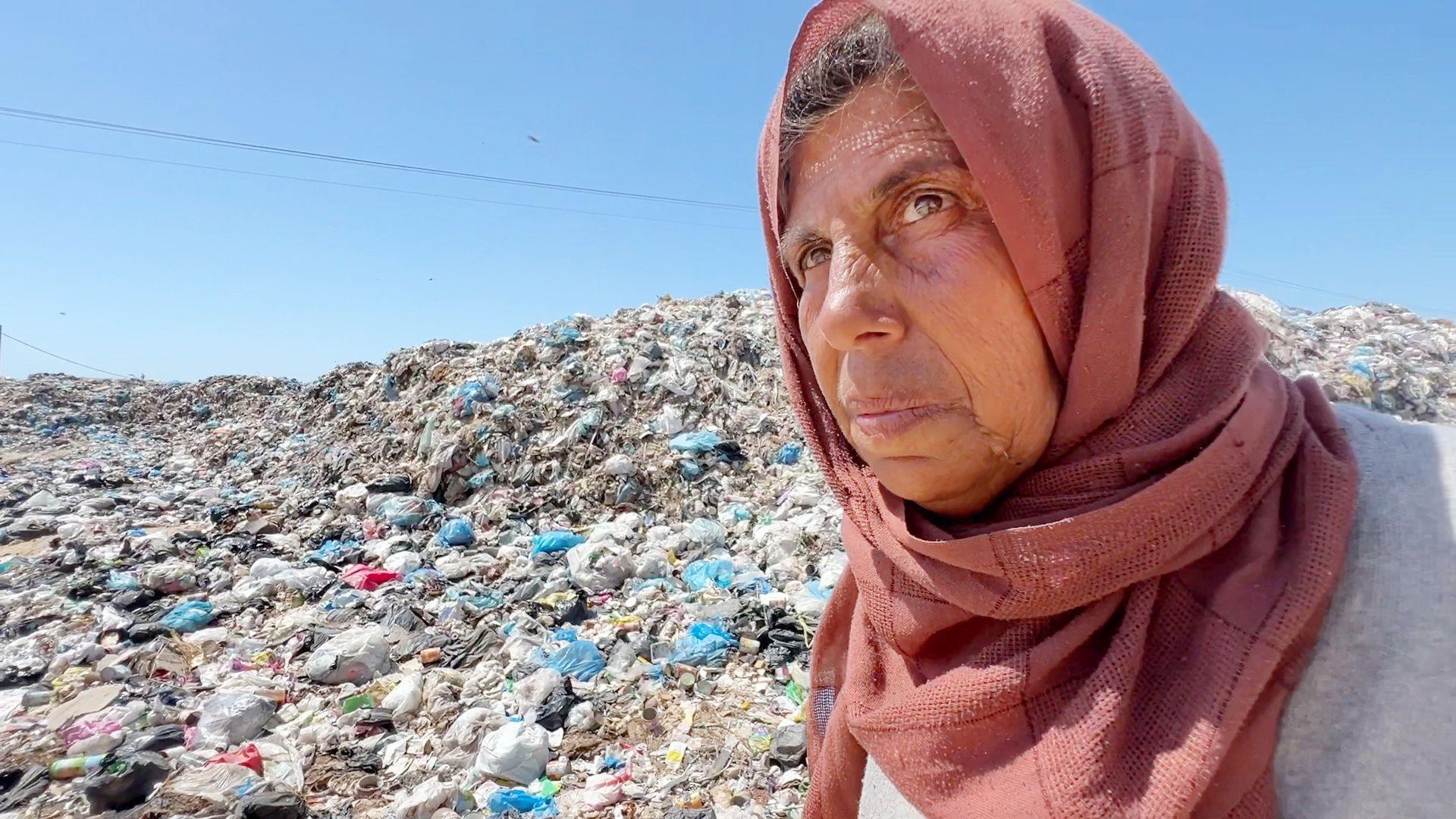
"There is no air," says Asmahan, "just the smell of rubbish"
Before the war, years of blockade imposed by Israel and Egypt on Gaza, which was governed by Hamas, had put a severe strain on basic services, such as waste disposal.
The tight restrictions for what Israel said were security reasons on what could enter the territory meant there were insufficient rubbish trucks, a lack of equipment for sorting and recycling household waste and for disposing of it correctly.
Since the deadly 7 October Hamas-led attacks, Israel’s military has blocked access to the border area, which is where Gaza’s two main landfill sites are located. One in Juhr al-Dik previously served the north, and another, in al-Fukhari, served the central and southern areas.
“We’re seeing a waste management crisis in Gaza, and one that has got a lot worse over the past few months,” says Sam Rose, director of planning for the UN agency for Palestinian refugees, Unrwa.
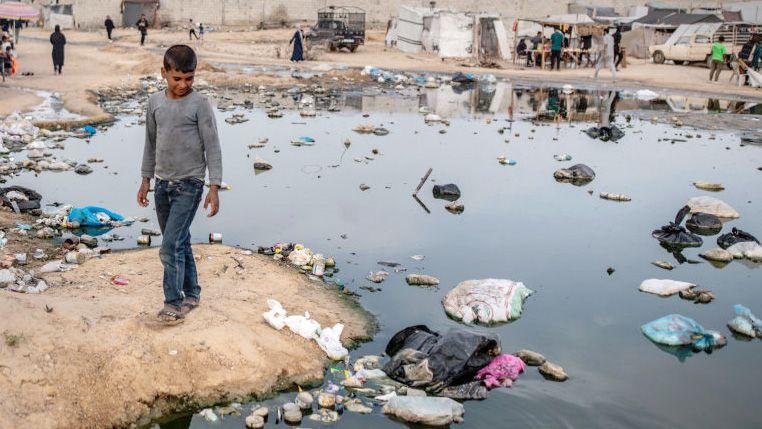
Gazans face the risk of disease with sewage water accumulating close to makeshift shelters
Social media footage compiled by BBC Verify shows temporary waste dumps have grown as people have fled in waves to different towns and cities. BBC Verify has authenticated these locations in Gaza City, Khan Younis and Rafah from February to June this year.
Satellite analysis by BBC Verify has previously shed a light on another aspect of sanitation problems, showing half of Gaza’s water and sewage treatment sites have been damaged or destroyed since Israel began its military action against Hamas.
“You see massive pools of grey-brown sludge around which people are living because they have no choice, and you see large piles of garbage. Either this is just left outside people’s homes or in some places, people have been forced to move near the temporary landfills that have been set up,” Mr Rose says.
“People are literally living amongst the garbage.”
The mass displacement of people has overwhelmed local authorities often dealing with damaged facilities because of the ongoing Israeli bombardment. They complain of a lack of staff, equipment, and rubbish trucks as well as fuel to run them.
More from Gaza
'My children cling to me as dogs raid graves near us'
- Published5 May 2024
Witnesses tell of 'unimaginable' Gaza shelter air strike
- Published6 June 2024
Mass graves and body bags at al-Shifa hospital
- Published5 June 2024
At the Khan Younis municipality, an official, Omar Matar, expresses regret over the appalling conditions for those now living near al-Aqsa University.
“These random dumps do not meet health and environmental standards. They do not stop the spread of odours, insects, and rodents,” he says.
“They were previously created as an emergency measure because of the closure of the Sofa landfill site [at al-Fukhari], until a solution is found with international institutions to transport the waste there,” he explains.
A spokesman for the Israeli military body, Cogat, told me it was looking at several different solutions for the Gaza waste problem.
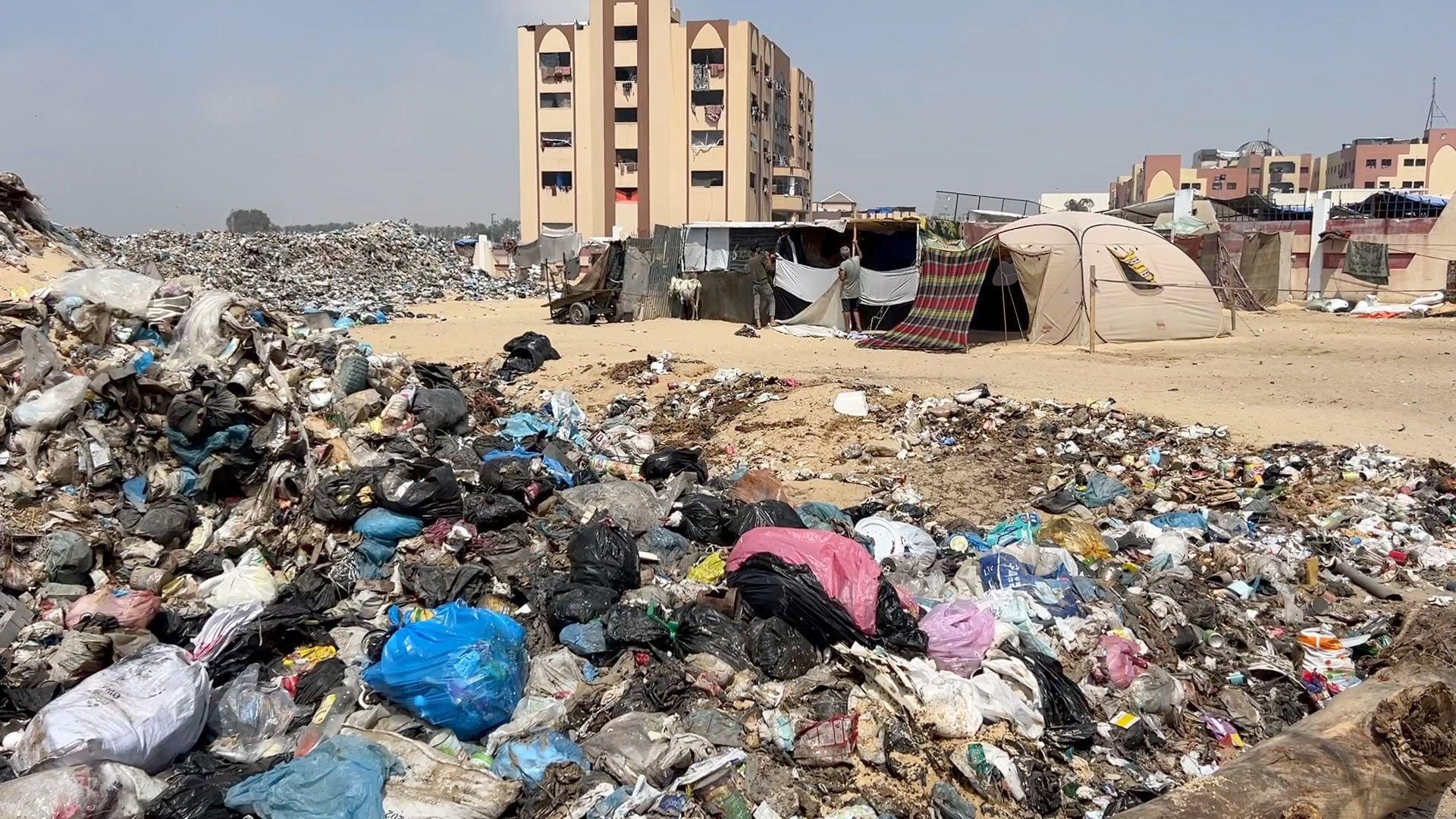
The campus of Gaza's al-Aqsa university has turned into a temporary landfill site in Khan Younis
The UN Development Programme says it has recently been involved in collecting 47,000 tonnes of waste from central and southern Gaza and that it has distributed 80,000 litres of fuel for the clean-up effort. But far more needs to be done.
Now as summer temperatures soar, there are new warnings from aid agencies about the health hazards posed by so much rubbish.
Yet, desperation drives many Gazans to take extra risks: scavenging for something to eat, use or sell.
“We got used to the smell. Every day we come here together to look for cardboard boxes and other things that we can burn to make fires,” says Mohammed, one of a group of boys picking over a rubbish dump near Deir al-Balah as it is filled with waste from aid packaging and rudimentary efforts to clear sites hit by Israeli air strikes.
Mazad Abu Mila, a displaced man from Beit Lahia, says he is looking for scrap metal that he could use to build a furnace.
“We left all our money behind, our shops, our cars, our livestock, our houses. All were left. This is the most dangerous thing for our health. I would never have gone to a rubbish dump before but right now, everyone is coming here.”
Additional reporting from BBC Verify's Paul Brown and Richard Irvine Brown